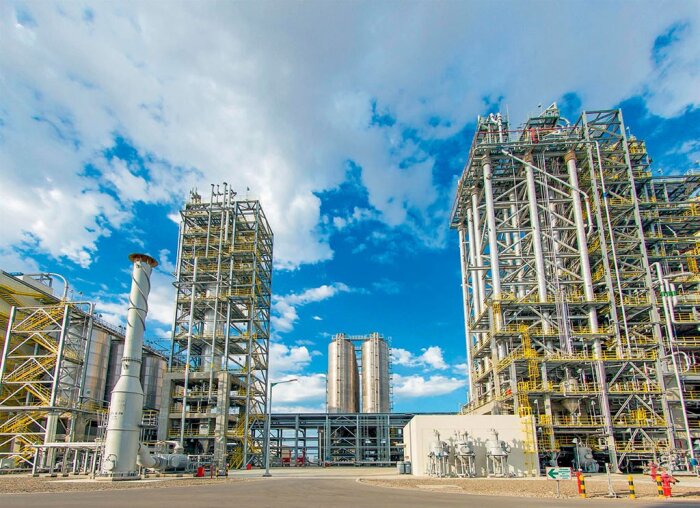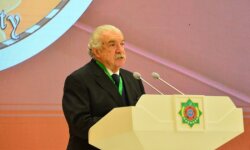 A senior lecturer at the Turkmen State Institute of Finance, an applicant for the degree of Candidate of Political Sciences Ruslan Jumaev shared the details of the development and diversification of Turkmenistan’s oil and gas sector with CentralAsia.news.
A senior lecturer at the Turkmen State Institute of Finance, an applicant for the degree of Candidate of Political Sciences Ruslan Jumaev shared the details of the development and diversification of Turkmenistan’s oil and gas sector with CentralAsia.news.
The analyst noted that the oil and gas sector is one of the crucial components of Turkmenistan’s fuel and energy industry. The development strategy determines the features, specifics and forecast indicators for this sector, as well as the system of interconnected decisions to increase Turkmenistan’s energy independence. In Turkmenistan, the current stage of economic and social development is characterized by changes resulting from a gradual and smooth transition to market relations. The introduction of a market economy involves the creation of a society-centred economy. The desire to realize this potential for the benefit of the country is reflected in the Oil and Gas Industry Development Programme of Turkmenistan until 2030.
In accordance with the energy policy of President of Turkmenistan Serdar Berdimuhamedov, the country is seeking to sustainably use its huge natural resources to improve the standard of living of present and future generations, as well as global energy supply for the benefit of all mankind. The figures show that Turkmenistan produced more than 83.7 billion cubic metres of natural gas in 2021. Natural gas exports increased by 34.8 percent compared to 2020, electricity generation increased by 11.6 percent, and electricity exports increased by 36.4 percent. In general, the external trade balance shows the positive growth dynamics, and energy exports can be highlighted in Turkmenistan’s external trade. According to statistical data, Turkmenistan is enhancing its export potential, and its top exports are natural gas and other fuel and energy products. This testifies to the continued demand for Turkmen energy amidst the global financial and economic crisis.
Jumaev noted that the fuel and energy sector is among the sectors of strategic importance in the economic policy of Turkmenistan for the period until 2030 aimed at promoting economic diversification. Turkmenistan’s earnings from natural gas and oil exports are the key source of material and financial resources that ensure economic stability of the country and improves the standard of living of the people. Seeking to ensure the integrated development of the gas industry, Turkmenistan is implementing a friendly investment policy that meets all the requirements of international practice. The Law of Turkmenistan On Hydrocarbon Resources, adopted in 2008, sets forth the legal framework to attract foreign investment and advanced technologies to the country.
The expert emphasised that Turkmenistan is pursuing the policy of diversifying international cooperation in the energy sector, in particular. This involves creating a multifaceted transport pipeline infrastructure to supply Turkmen resources to the international energy market. In this regard, global security and energy transit as an important tool for the social and economic progress of the country is closely related to the fulfilment of these tasks.
Energy diplomacy of Turkmenistan has many vectors. The important aspects of the new energy policy of the President of Turkmenistan are to coordinate production sharing activities and increase the number of foreign investors. Proven and promising hydrocarbon reserves have enabled Turkmenistan to conclude long-term cooperation contracts in the gas sector with Russia, China and other countries. Along with the newly built facilities, the Turkmenistan-Afghanistan-Pakistan-India project is important in ensuring energy security and prosperity of the region and creating new jobs. The country is ready to transit energy in various directions.
Ruslan Jumaev added that the CAC (Central Asia-Centre) pipeline is functioning effectively, and the Turkmenistan-Uzbekistan-Kazakhstan-China gas pipeline will be expanded. The Chinese side has contracted for the supply of up to 40 billion cubic metres of natural gas annually. In November 2011, an agreement on the supply of additional 25 billion cubic metres was signed during the official visit of the President of Turkmenistan to China. Technical work on this project is underway, and these amounts are being documented. The main source of raw materials is the fields on the Bagtyyarlyk contract territory, which are explored, equipped and developed by the Chinese National Petroleum Corporation under the production sharing agreement. As of early 2020, this company have invested over $8.2 billion in this project.
The university lecturer said reliable and stable transit is a foreign policy priority of Turkmenistan. The President of Turkmenistan keeps calling on the world community to conduct regular and multilateral consultations on positive interaction in creating an extensive pipeline network to transit energy to world markets on a sustainable and long-term basis. One of the main areas of these relations is to develop effective ways of achieving global and complete security and ensuring reliable energy transit. The priorities of the energy vector of the foreign policy of Turkmenistan include the establishment of positive cooperation, compliance with international law, the adoption of universally recognized principles and values of good neighbourliness and the search for peaceful and mutually acceptable solutions to current problems.
Jumaev emphasised that today international energy cooperation is one of the factors contributing to global economic prosperity and growth. Turkmenistan, as one of the world’s energy powers, has been paying special attention to energy security in recent years. This is because the contemporary global energy supply system has become a vulnerable segment of the world economy. Such shortcomings are stemmed from several reasons, namely political instability in some regions of the world or the lack of universally recognized international legal instruments.
Turkmenistan is putting forward its initiatives to take preventive measures in this regard, which include not only local agreements on specific issues of fuel supplies, but also the creation of a global model of relations in the world energy market. Turkmenistan aims its proposals at discussing issues related to the development of a new international legal framework for modern energy cooperation not only within the UN General Assembly, but also within the major international forums and high-level meetings. In this regard, the Turkmen side attaches great importance to using the capacities of major international and regional organisations as an effective tool.
The analyst stated that Turkmenistan contributed to developing the Sustainable Development Goals, adapting them to the national socio-economic development plans and strategies. Furthermore, the adoption of the Convention on the Legal Status of the Caspian Sea opened up new opportunities for joint efforts on a solid international legal basis. New strong incentives for the influx of substantial foreign investments into the Caspian Sea region on a sustainable and long-term basis are generated. This gives a powerful impetus to the development and dynamic growth of national economies, the creation of new industries and jobs and the improvement of the quality of life of the people.
«Thus, Turkmenistan is putting forward its initiatives to take effective measures to ensure energy security, which include not only local agreements on specific issues of fuel supplies, but also the creation of a global model of relations in the world energy market,» a political scientist Ruslan Jumaev concluded.



